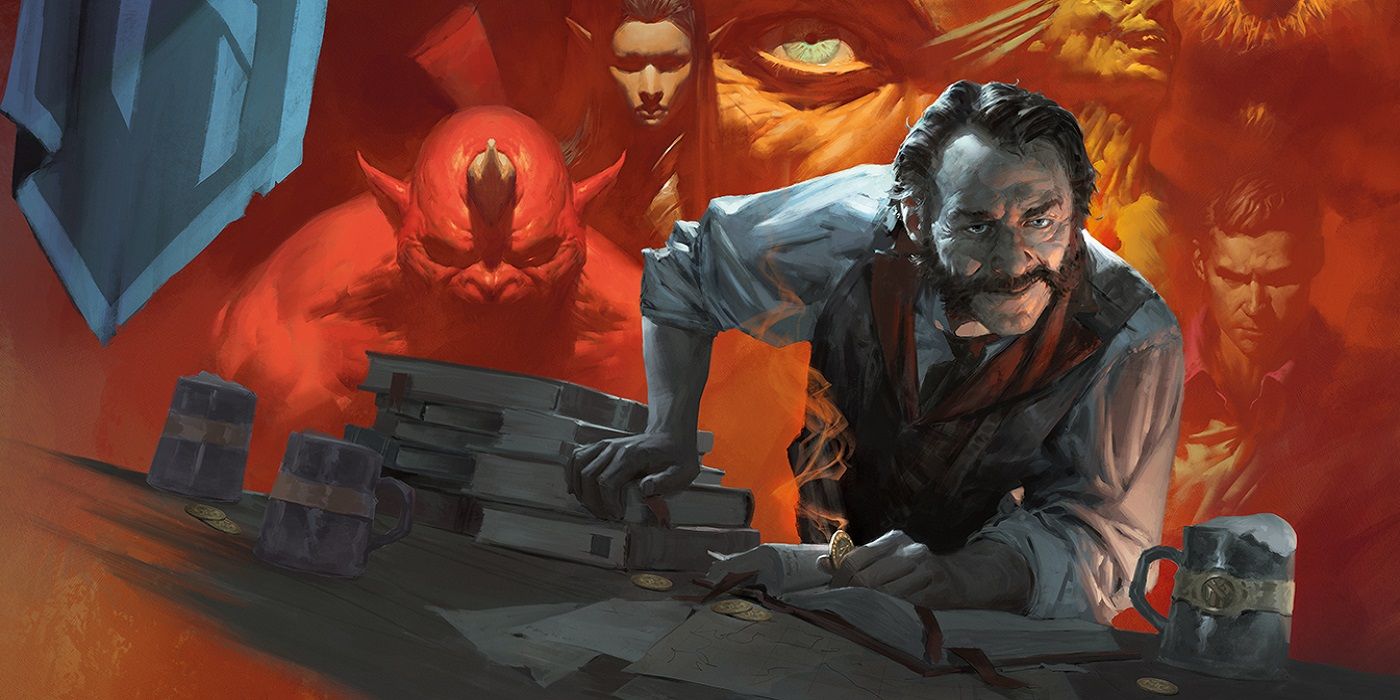Money can be a game-changing strategy in Dungeons & Dragons, leading to creative thinking around the standard Gold currency system. However, bending the rules on how to earn money, find items of worth, or keep a bank account full can sometimes create game-breaking problems for both the DM and players in the party. To help prevent this, DMs may need to add rules to govern how players amass currency or alter what Gold can do to prevent unfair advantage during a campaign.
The currency system is made up of several basic pieces. Copper, Silver, and Gold pieces are regularly exchanged for gear, goods, components, or services. Each player starts out with a different amount of currency when entering a campaign. The amount is based on the character's class and background. A noble Wizard will start with more gold than a sailor Fighter. Players with certain classes may also find amassing wealth less difficult, with the Rogue proficiency in Sleight-Of-Hand or the Bard's high Charisma being beneficial in both theft and haggling.
Unfortunately, because money is a useful tool in most Dungeons & Dragons campaigns, it isn't uncommon for issues to arise as certain characters get clever about their coinage. From hoarding Gold pieces to the detriment of a party to having more money than is needed by any single character, Gold abuse can quickly create big issues in campaigns. Because of this, the DM may need to step in and put rules in place for how much Gold a character can have at one time, or how Gold is acquired. Below are several issues that can arise with the Gold system in D&D, and how DMs can help prevent the issues from breaking D&D campaigns.
D&D Gold Abuse Scenarios And How They Break Campaigns
While having wealth is important for ensuring access to goods and services in a Dungeons & Dragons campaign, hoarding money to ensure there is enough for important moments can become a big problem. A player may choose to avoid spending their Gold, saving it for what could be deemed a game-important moment, but then not purchase needed gear and supplies. A player could end up relying on other party members for access to potions and other essential items when in combat instead of providing their own, leaving others to carry the financial burdens of an adventure. This can become especially problematic when a player won't purchase gear upgrades and weapons, relying entirely on looting to improve their arsenal. The player can quickly fall behind and find themselves at a major disadvantage in combat, making progression frustrating for everyone involved.
Dungeons & Dragons billionaires can also become an issue for clever Gold coin earners. Whether the player likes to take odd jobs in towns and cities or is a serial pick-pocket, once a player has amassed enough money, success is nothing more than a price to pay. Players can buy their way out of jail, purchase any top-tier gear in a shop, or load down on essential items for the entire party. A player's amassed wealth can easily escape a DM when the Gold pieces are hidden in the form of gemstones, jewelry, and other valuables that have been lifted off NPCs, making the sudden rise to riches surprising for the campaign runner.
One of the biggest struggles a DM can face with Gold in a Dungeons & Dragons campaign, however, is when a player becomes more invested in earning money than engaging in the actual plot and objectives of a campaign. Instead of investigating important places in town, the player may become sidetracked in creating wealth-earning gigs. They may spend more time looking for side jobs than engaging with their party members or even try to steal unfair portions of loot in dungeons. This can cause friction between D&D players and make success less rewarding for the party.
Dungeons & Dragons Gold Abuse Solutions That Don't Stifle Players
While D&D Gold system struggles can feel daunting to reign in, there are many ways a DM can implement rules to help prevent abuse of the system. For example, a Gold and gemstone carry limit can be placed at the start of a D&D campaign to discourage coin hoarding early in the game. The cap could change by leveling, slowly increasing the maximum carry limit, but always keeping the amount of possessed gold at a reasonable number per player. It can also help prevent players from becoming fixated on wealth, as once the max limit is achieved, they will have no further need to grind for currency.
DMs dealing with eager pick-pocketing Rogues in Dungeons & Dragons can also change the rewards of successful theft. Instead of a purse filled with gemstones and coins, players could instead find common items like potions. This still gives a reward for the player's effort but could discourage constant attempts once the player is loaded down with items. A Dungeons & Dragons DM could also change the success requirements, raising the difficulty and risk of theft attempts that could hold more profitable items. This helps players think carefully about the risk before trying to rob an NPC.
For DMs who have money-obsessed characters, sometimes the best action is to sit down with the player before a session and talk about the direction of gameplay and what their goals are. If a Barbarian has become fixated on amassing money for a personal goal, the player may be feeling lost on what their motivations are in the campaign's main story. Chatting with players can help create new focuses and clarify areas where struggles may be happening. It can also be helpful to remind players unwilling to spend money that supporting the party is part of what makes D&D an enjoyable experience. If they aren't willing to take care of their character's needs and help out other players, the party members may be less likely to assist them, resulting in an untimely character reroll if combat goes badly.
While navigating Gold abuse can be frustrating for Dungeon Masters more interested in building the next narrative challenge for their players to tackle, ensuring the Gold system is functioning correctly helps provide a more balanced game. By encouraging players to earn, save, and spend wisely, the campaign is less likely to encounter snags with gear and item availability. It also encourages D&D players to think creatively when problem-solving instead of relying on money, offering more engaging gameplay. These moments of teamwork and strategy are what often create the best moments within a Dungeons & Dragons campaign.



